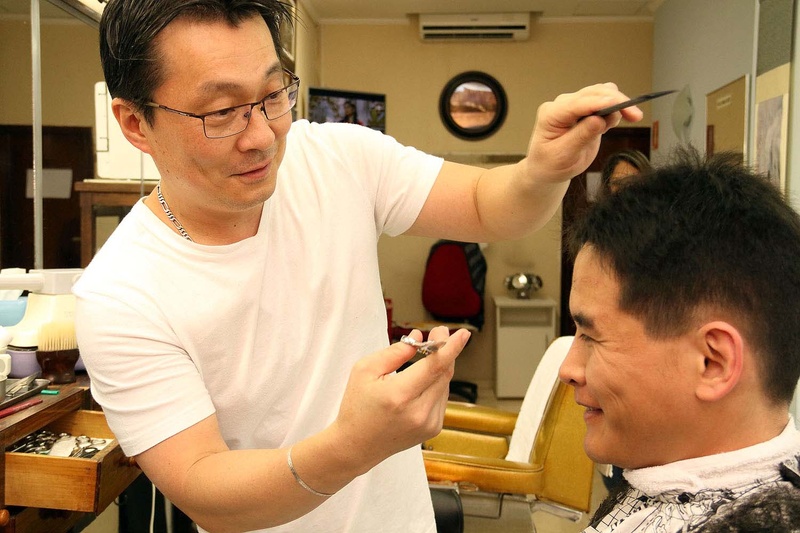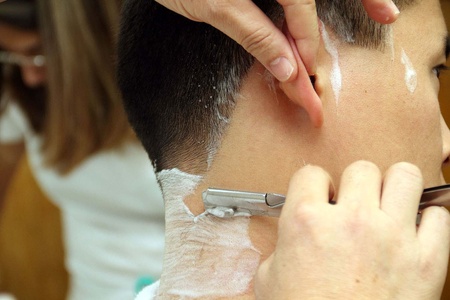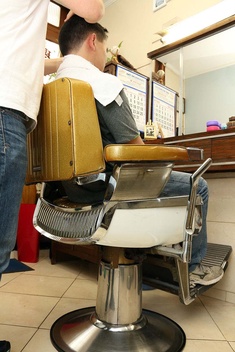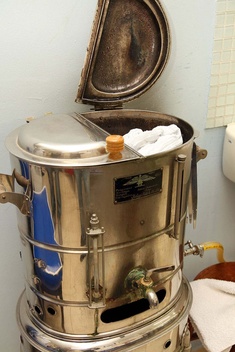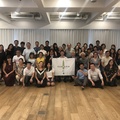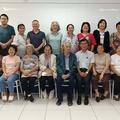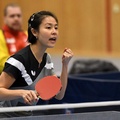When a Nikkei gets a haircut in Brazil, they often hear that “cutting Oriental people’s hair is difficult.” The reason given is that the strands are very smooth, sometimes too thin, sometimes too thick. Thus, it would be difficult to make different hairstyles, and the cuts show errors more easily.
To meet this demand, currently, there are many hairdressing salons specializing in Easterners. They also offer dye services, manicures, and other aesthetic services, with the target audience mainly made up of women.
Haircutting is a service that involves some periodicity—people hardly go every day—different from a store or a restaurant, where the frequency tends to be higher. The question of fidelity gains special relevance.
Moreover, different from the commercial sector (in which the customer basically chooses and pays to complete the transaction), the service sector involves some communication. In this case, the customer must explain how they want the cut.
Obviously, this demand for haircuts by Easterners, more specifically the Nikkei, is not new. Since the arrival of the first Japanese immigrants to Brazil, hair and barber services were necessary.
Yahiro barber shop, located in Liberdade, a well-known Nikkei community district of São Paulo, helps to illustrate this story. Teruo Yahiro, a 39 year old Nisei, is currently responsible for the business, whose family came to Brazil in the early days of immigration.
“After a few years, in 1950, my grandfather decided to sell the coffee farm and return to Japan,” says Teruo. Of the 12 children, only one, the eldest, stayed in Brazil. He was a barber in the city of Arapongas, State of Parana, south of Brazil.
“In Japan, my grandmother said to her children, ‘you should learn the business of your older brother. With a comb and scissors, you can run the whole world and will not starve.’ So, my father and my aunt learned the profession in a famous school in Japan. Then, they went back to Brazil.” The year was 1975.
Motohide, Teruo’s father, went straight to Liberdade, which already had the most concentrated Japanese community of any district in the city. The first job was at an establishment called 3B, “because it was a bar, billiards, and barber shop,” explains Teruo. In 1979, Motohide went to work with his sister at the place where today is the Yahiro barber shop.
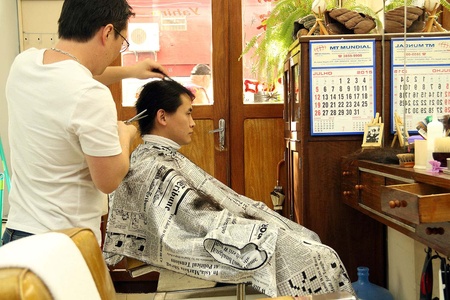
(Photo: Henrique Minatogawa)
To have a haircut in a traditional barber shop is a different experience. First, a warm towel is applied to soften the strands. Then, the final step is made with razor with disposable blades. Also, cleaning of the ears and cutting of the nose hair is done—something common and necessary for men from a certain age. Furthermore, in some salons, you can get a massage, it’s a little more hardcore—and efficient. The predominant smell of shaving foam is mixed with the water steam.
I was amazed, although it was not exactly a surprise, to learn that the furniture, chairs, and towel heater came from Japan, brought by ship to Brazil. “Basically, we kept the face of tokoya [Japanese barber shop]. It all came by ship with my father. So, there are things here that are relics,” says Teruo.
Everything is in very good condition. “Maintenance is not very complicated, but we have to take care. At that time, products were made to last many years. So, maintenance is minimal,” Teruo explains. The chairs, from Takara-Belmont, eventually demands some repairs of the cushions. As another example, he points to the towel heater, manufactured by Riki Takagi & Co, “It is about 70 years old and has never broken.”
Currently, in São Paulo, the retro (or vintage) style barber shops are the new trend. New salons are decorated under the influence of older styles, while the originals get new customers.
“Many seek barber shops also because of a sentimental side. When a kid, jichan [grandfather] or the own father went get his hair cut, shave, and everything. They may want to recall those nostalgic moments of going to the barber shop as a child,” Teruo guesses.
Maybe those looking to relive the old days in the barber shop also remember the time when they did not define the cut of their hair themselves. Nowadays, children have much more power to express their opinions [so it seems to me], but a few years ago, it was the parents who determined how the service would be done.
“There was a time that the children of my father's okyakusan [customers], the elders, started to come, and they wanted the children to have a very short hair cut, always had to be short. I had to adapt myself not to upset the boy, so he would keep coming here; I had to make a compromise. Over time, I had to trick the father in some way so that the cut would not be so short and also keep it fashionable for the boy as well. It was a nice time,” recalls Teruo.
Nowadays, the shop is frequented by youngsters too, both Nikkei and those of other ancestries. To follow the latest trends, Teruo says that he usually watches Japanese dramas to know what the styles are of the actors and singers famous among the youth.
Generations
In a barber shop in operation for so long, it is natural that customers become loyal. Yahiro barber shop has reached the third generation of customers. “Now, my wife and I are starting to attend the weddinga of the children of okyakusan. Then, birth of their kids. Preferably, we are happier if it is a boy, so it gives continuity to my work [laughs],” Teruo says.
However, there is another side, a little sad one. “The first generation is passing. Many okyakusan have died, from my father’s time. They were okyakusan for 40, 45 years… That’s the sad part. We learn a lot from them. I learn a lot with them here at the shop,” says Teruo. “My father worked as a barber in a ship, cutting the hair of the crew and immigrants. One of them, until some time ago, had been cutting here. But it has been a while since he has come…”
In some exceptional occasions, Teruo and his wife have served hospitalized clients. “In general, we’d go to the hospital for a haircut and shave for okyakusan in a time when there is was a slight health improvement. However, usually they end up passing shortly after,” he laments. With all the resulting sadness, they decided not to do this kind of service anymore.
Helping his father
“I came to help my father from an early age, from 10 years old. I swept the room, washed cloths… During vacation, I was always here,” recalls Teruo. It was the mid-80s. “It was the time when Liberdade was really a Japanese neighborhood. I remember a time when they had a higher purchasing power, many worked in Mercadão or Ceasa [large commercial centers of groceries in São Paulo]. I remember that the tips were also very good.” [In Brazil, tips are not mandatory.]
Teruo also points out a difference of the customer profile. “It was the time of the tough nihonjin. Those customers did not care about beauty; to have a professional that works well, it was enough for them.”
Regarding this matter, there are still some remnants of a more conservative approach, such as criticism of the beard (a fashionable look currently in Brazil). “I was drawing attention because I was letting my beard grow. ‘What about this dirt under your chin?’ or ‘What about this thing in your ear?’ [earring]. There was a lot of it,” recalls Teruo.
It was in a way like how Teruo learned his profession. “I learned from my father according to the old school, so it was all on the basis of scolding. There was a situation of a lady who worked here. She also learned from my father. I remember she used to go into the resting room after a scolding. Half an hour later, she came out with a red nose. It was a strict teaching, proper nihonjin.”
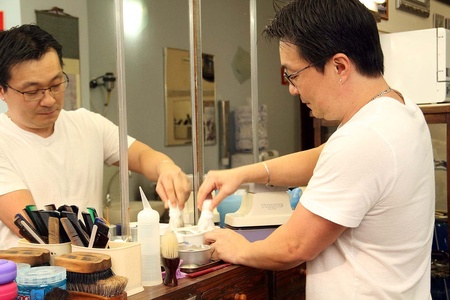
(Photo: Henrique Minatogawa)
The situation did not change outside the barber shop. “At home, it was even worse. So much that today, the three brothers can speak nihongo [Japanese language] because the scolding my father used to give. At home, at least, we could not speak Portuguese,” says Teruo.
Being able to speak Japanese is very important at the barber shop because many of the customers are Japanese who work in Brazilian subsidiaries of Japanese companies. “Companies change their local staff every four years. When the current staff returns to Japan, the next already knows where to get their hair cut. This comes from long ago, since when my father started,” says Teruo.
Teruo and his wife have two daughters. Despite the gap of time, he gets inspiration by his own education to raise them. “They are from different generations. Since today everything is easier, there is a lot of information, we must be very careful to educate. That traditional side my father taught us helps a lot to educate the young of this generation.”
Continuity
Teruo states that he was not pressured to continue the family business. “I help my father since I was a boy, so, for me, it was natural. No pressure at all. My father, of course, wanted one of the three children to continue. My brothers also tried, but did not continue. I’m the middle child.”
However, for the future, he is not optimistic right now. “Unfortunately, I think this business has met its countdown. It is very difficult to teach in the same way my father taught. Young people today can no longer fit to an old system of teaching,” he regrets.
Teruo mentions examples from other areas. “In Japan, one learns from below. To be a sushiman, for example, one has to wash many plates, clean many fishes. Many things my father told me to do, if I try to mold a professional in the same way, today’s youngsters do not accept. When I was young, I sat, with scissors in hand, training. I got tired, the eyes were closing. My father, quietly, took the towel and threw it all in my face. If I do that today, I would be surely prosecuted. Therefore, this business is headed towards ending.”
Teruo began working regularly at the barber shop when he was 20. “scolding served to always improve, always get the cut right. I was very young, talked back to him. Gradually, I began to understand. My father, in Japan, so he told me, suffered greatly in his master’s hand. So much that when he talked about his master, he usually ended up crying.”
“I think it is according to that style that he wanted me to learn. Today, after I lost the old man, the thing I miss the most are those scoldings. All that I am, all I have, is thanks to the master I had.”
© 2015 Henrique Minatogawa


